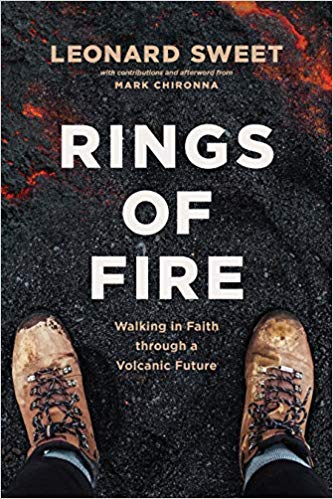Rings of Fire
by Leonard Sweet
–Review by Vern Hyndman
One of the amazing benefits to studying with Dr. Leonard Sweet is that on occasion Len will invite participation in his books. Here’s probably no one more careful to footnote the contribution of others, and over the years I’ve leaned into Nudge and Bad Habits, with honorable mentions other places. Social media is Len’s open invitation to participate, of which I avail myself several times a week (day, sometimes hour). Those who know me well will understand why Bad habits. Other times Len offers a preview of what he’s writing, after having been sworn to secrecy. This book review honors that secrecy while offering an exciting foreshadowing of what is to come.
Len is a master semiotician, maybe best described by the ancient Tribe of Issachar; “they read the signs and knew what to do.” Len is a futurist. Rings of Fire is the most recent book of a series of books over the previous decades. Faith Quakes (1994) germinated from a multi-faith meeting Len and others attended with Mikhael Gorbachev. Soul Tsunami (1999) illuminated the future of a church that who couldn’t spell or define tsunami entering the unknown of the 21st century. Today most of us can spell tsunami, and we all have video images etched in our memories of exactly what tsunami means. Len was ahead of his time. Carpe Manana (2001) helped make sense of a digital world.
Fasten your seatbelts.
The rate of change is increasing. The title Ring of Fire is borrowed from the name of a 25,000-mile horseshoe-shaped arc of 75% to 80% of the world’s volcanoes. The world is now one global ring of fire.
Ring of Fire provides helpful categories of change that is on the horizon. There is no place to hide from the change, the church needs to be fiery.
Len often says the worst mistake to make is a categorical mistake, to be looking and expecting in the wrong category. First-century Jews looked for a military messiah and many missed the baby who saved the world in an epic categorical mistake. How can we, the church, avoid categorical mistakes if we’re blissfully unaware of the categories?
In your mental ramblings, do you consider the ripple effect of having become a cyborg? This topic is a bit late, given how far we’ve already transitioned, but are you vaguely interested in what cyborg living will mean? Is cheating with a machine cheating in your marriage?
We are struggling with alternative marriage, yet have you considered how the rights of an artificial intelligence (AI) being might work when asking the church to marry a human cyborg? What if the AI’s arguments are more persuasive than anything you can muster? Is unplugging the machine hosting the AI murder? Movies like “Her” have explored this concept, and yet it hasn’t been a common post-prayer meeting conversation. Let’s start the conversation. Ring of Fire will kick the conversation off.
Ring of Fire may be the first introduction some folks have to semiotics; reading symbols and signs. “How well do disciples of Jesus know how to communicate in symbols? One wonders if the most important division within Christianity today is not left and right, liberal and conservative, but symbolists and literalists, literalists who have a hard time understanding a messiah who came not parsing texts on vellum but speaking in signs and stories.”
Let me tease you; Ring of Fire delves into topics with the following keywords, at least in my advanced copy… sexularism, ecological extinctions, collapse of nation states, sacralization, suicide culture, gender and gendering… Chinafication, wrongful life, reproduction crisis.
Maybe the most powerful thing that Len has taught me in graduate work including both a masters and now a doctorate, is to “stand under” an author; that it’s important to read the entire work and be able to reiterate it to the author’s satisfaction before criticism is valid. Celebration before cerebration. For many folks, Ring of Fire will be the first look into an unimaginable future. To know the future is only partially a revelation by the Spirit; there is hard work in reading a vast variety of works, of understanding dead people and their context, and of resonating with a world-wide multiple-generation populace, of staying current, and playing with technology for the sake of curiosity. Becoming a semiotician is to be a farmer who plows his fields every day; who remains open and fertile while others are along for the ride and not necessarily attentive.
Ring of Fire is “bring your audience to work” day for semioticians, the ride-along event that informs but also hopefully invites and inspires.
Please consider pre-ordering your own inspirational invitation.

